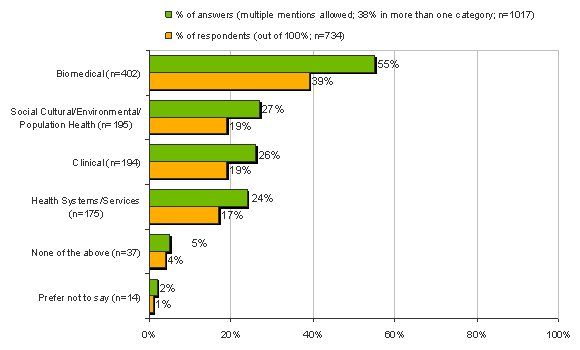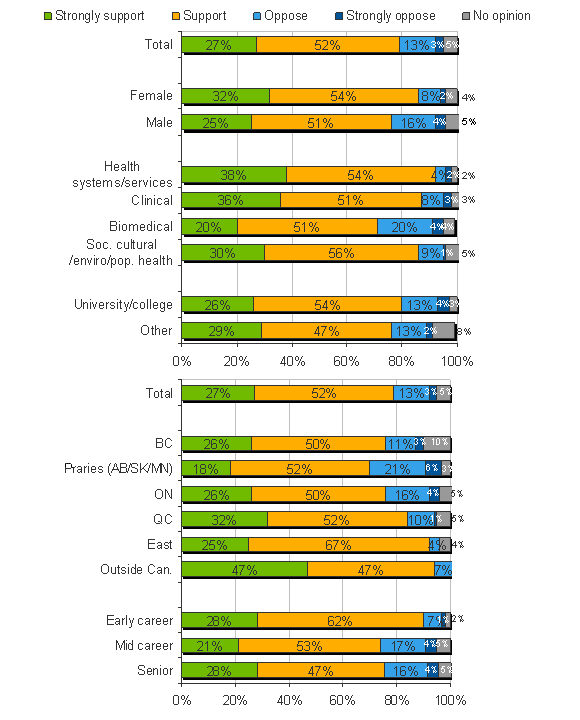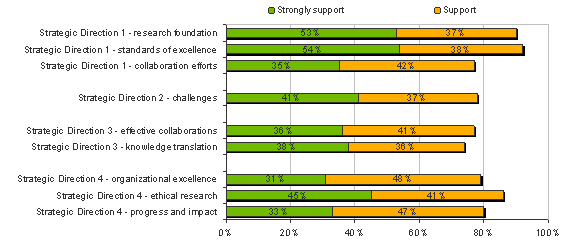National Consultation Summary Report
July 2009
During the spring of 2009, the Canadian Institutes of Health Research (CIHR) conducted a national consultation of the health research community and various stakeholders to gain input on its second strategic plan – Health Research Roadmap: creating innovative research for better health and health care, 2009-2014. Roadmap is built on the extensive work of CIHR and its 13 Institutes over the past nine years. It is grounded by CIHR's mandate and commitment to support excellence across all four health research pillars: biomedical; clinical; health systems and services; and social cultural, environmental factors that affect the health of populations. While setting a clear direction for the 21st century, Roadmap reaffirms CIHR's ongoing commitment and support for health research that is broad-based and generated by the best ideas and the brightest minds Canada has to offer.
Approach
The health research community has been an integral part of the development of this strategic plan. CIHR's President visited university campuses across the country to meet with health researchers and to hear first-hand about the advances that are being made and the challenges that exist within our health research communities. Additionally, CIHR conducted a web-based survey over a six-week period during the spring of 2009. It was open to all of Canada's health researchers and those interested in the work that the agency supports. The web based consultation was conducted using a draft plan that was made publicly available as a consultation document. The survey provided CIHR with invaluable feedback regarding the directions laid out within the strategic plan. Finally, a number of stakeholder organizations and CIHR's Institute Advisory Boards provided written comments or shared their ideas about the strategic plan with CIHR's President and Scientific Directors. Overall, more than 12,000 individuals and organizations were invited to participate in the consultations, and approximately 1,700 people took part. We are grateful for their contributions. Figure1 provides a breakdown of those who responded to the web survey, based on health research pillar.
Figure 1
Breakdown of Participants – by Pillar

Results
Based on the web-survey results, overall support for the strategic plan amongst the health research community is high at approximately 80 percent. This support is reflected in the many comments submitted to CIHR stating the document is balanced and credible across CIHR's four pillars of health research. Figure 2 provides a picture of how support is broken down by gender, pillar, region and career stage.
Figure 2
Level of overall support for CIHR's five year strategic plan

This type of support helps to confirm that the directions CIHR has set-out for the next five years are appropriate and in-line with the thinking of Canada's health research community. Figure 3 shows that support for each of the four strategic directions is high among those who participated in the web-survey.
Figure 3
Support for each strategic direction

Common Themes
There were a number of re-occurring themes that arose during the face-to-face interactions during university visits. These same themes were also found in the written submissions and comments provided via the web-survey. They have been grouped together under seven themes:
-
Basic Science: Supporting 'basic research' has always been a strong, foundational element for CIHR. Through funding basic research CIHR is able to spur innovation and support excellence in health research. Ensuring the integrity of basic research funding is an important priority for Canada's health research community and as a result numerous recommendations were made suggesting that CIHR must underscore it commitment to basic research within Roadmap.
-
Sustaining the Health Research Enterprise: Since the creation of CIHR in 2000, Canada has built a strong and dynamic health research enterprise. In fact, Canadian health research is considered to be one of our nation's competitive strengths. As such, ensuring stable and predictable funding for the direct costs of research is vital. Canada's health research community noted this through the consultation process, while acknowledging the significant government investments that have been made in areas such as infrastructure, equipment and talent.
-
International Endeavours & Large-scale Projects: Competing on the international stage and participating in strategic, large-scale international initiatives will strengthen Canada's S&T standing well into the 21st century. CIHR is committed to supporting our health research community in this regard and will articulate how it will be done through a forthcoming international strategy. During the strategic plan consultations, Canada's research community articulated that international activities are important and that CIHR has a role to play. The community also indicated that CIHR must be vigilant that providing funding for new international initiatives does not come at the expense of maintaining support for traditional areas.
-
Post-Doctoral/Training Support: A vibrant research enterprise is built on new ideas and strong talent. CIHR is committed to fostering Canada's health research talent through providing competitive scholarships and prestigous awards at the masters, Ph.D and post-doctoral levels. Currently, CIHR supports students through programs such as the Canada Graduate Scholarships and the newly created and internationally prestigious Vanier Scholarships. However, more can be done. CIHR's consultations provided a forum for trainees to express their excitement about building a career in health research and the need to have our support in achieving their dreams.
-
Peer-review: The health research community is committed to CIHR's peer review system and all agree that it is the best possible way to ensure support for excellence and innovation across all four pillars of health research. When surveyed about CIHR's commitment to strengthen peer review quality and improve the breadth and quality of peer review panels, over 90 percent of web-survey respondents agreed this was important activity as it will enhance international standards of excellence. In an effort to provide insights on how to make peer review stronger the research community noted areas of concern, including: peer reviewer fatigue; work load; appropriate expertise; and committee culture. In addition, members of the population and public health community are keen to support CIHR in ensuring that the appropriate peer review panels exist for their area of focus.
-
Population Health: With the creation of CIHR in 2000 came a broadened mandate to support health research across the full spectrum. This includes the important field of population and public health research. Over the past decade research excellence and capacity in this field have deepened and important progress has and is being made to better understand the health determinants that impact on our overall health. Health researchers from the Pillar 4 community are excited by the momentum that has been built with the support of CIHR. Through the consultation process they encouraged CIHR to more clearly articulate the organization's support of population health and to generating the important knowledge needed to inform better health policies and practices.
-
Knowledge Translation: When CIHR was created it was decided that supporting the knowledge translation (KT) of health research was to be a key component of CIHR's mandate and activities. This includes supporting commercialization, moving research results into action via policy and programs and working with researchers and end-users to ensure that the best and most up-to-date information is available to support those providing health care to Canadians. Support for KT has been building over the years and CIHR's partners are keen to work with CIHR on furthering knowledge translation research and activities. In fact, the web-survey results showed that 79 percent of web-survey respondents indicated their support for CIHR's commitment to intensify its KT activities. CIHR will be working in the years to come to ensure that health researchers from all of CIHR's pillars fully embrace and understand how KT is important and fits in with the work they are conducting.
Conclusion
The perspective and needs of Canada's health research community have been considered equally in the drafting of Roadmap, and it will be with partner and stakeholder support that CIHR will succeed in implementing the plan in the years to come. Through our consultation process, CIHR heard from a large cross-section of stakeholders and we thank them for their support and for the honest feedback provided. CIHR is now considering how best to modify the strategic plan, so that it is reflective of the comments received from Canada's health research community and of the support it has given to the four strategic directions.
The work of CIHR's 13 Scientific Institutes has been instrumental in building CIHR's new strategic plan. The Scientific Council - comprised of the Scientific Directors for each Institute - has offered important guidance in the development of Roadmap. They have worked to ensure a balance between all four pillars of health research is reflected and that the document is relevant to Canadians and sound scientifically. With the leadership offered by our Scientific Directors CIHR will set in place annual implementation plans that will ensure the work of the Institutes is in keeping with the directions outlined within Roadmap. With the input provided during the consultation process we believe that the new plan will set out a vision that will ensure Canada's place on the world stage for health research in the years to come.
This summary report was prepared by the Policy and International Branch at CIHR. Further inquires about this report and CIHR's upcoming Roadmap should be directed to: strategicplan@cihr.ca.
- Date modified: